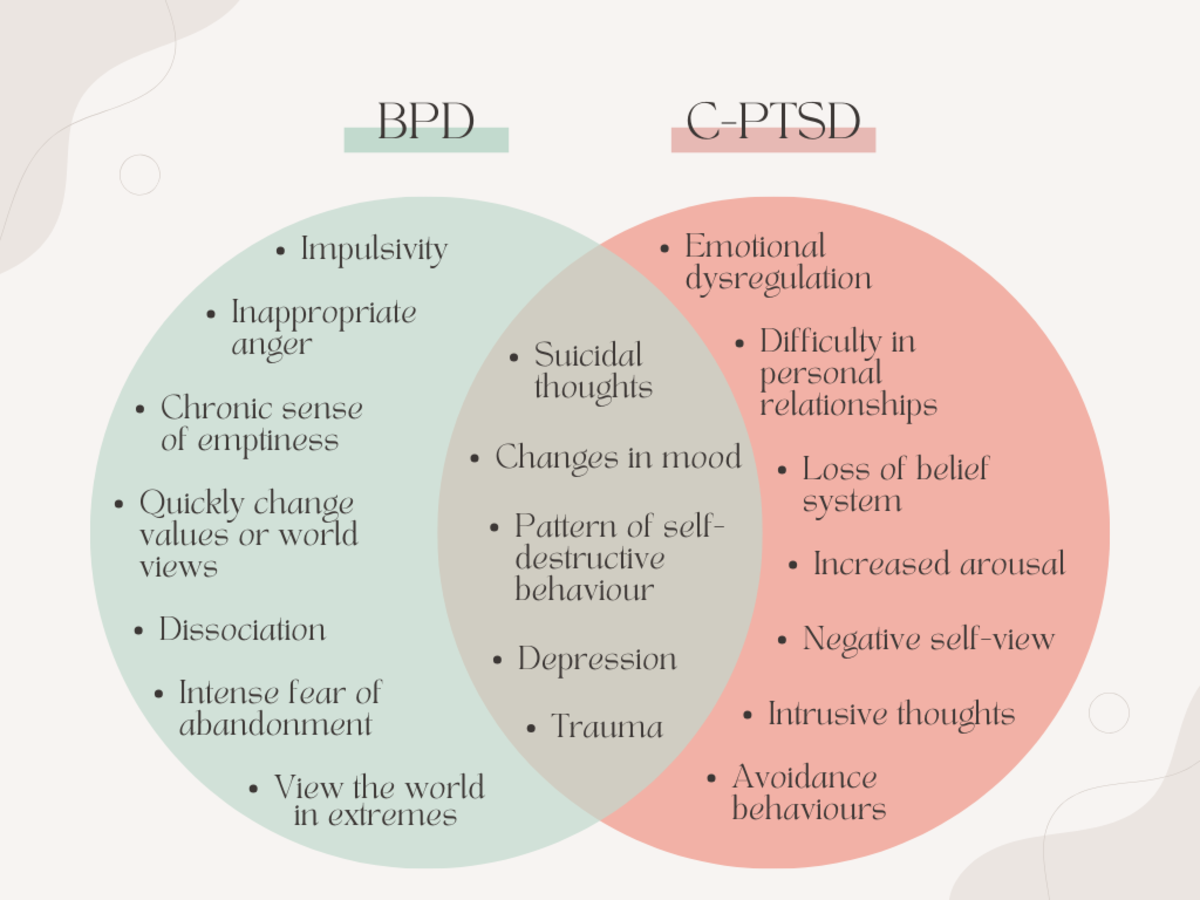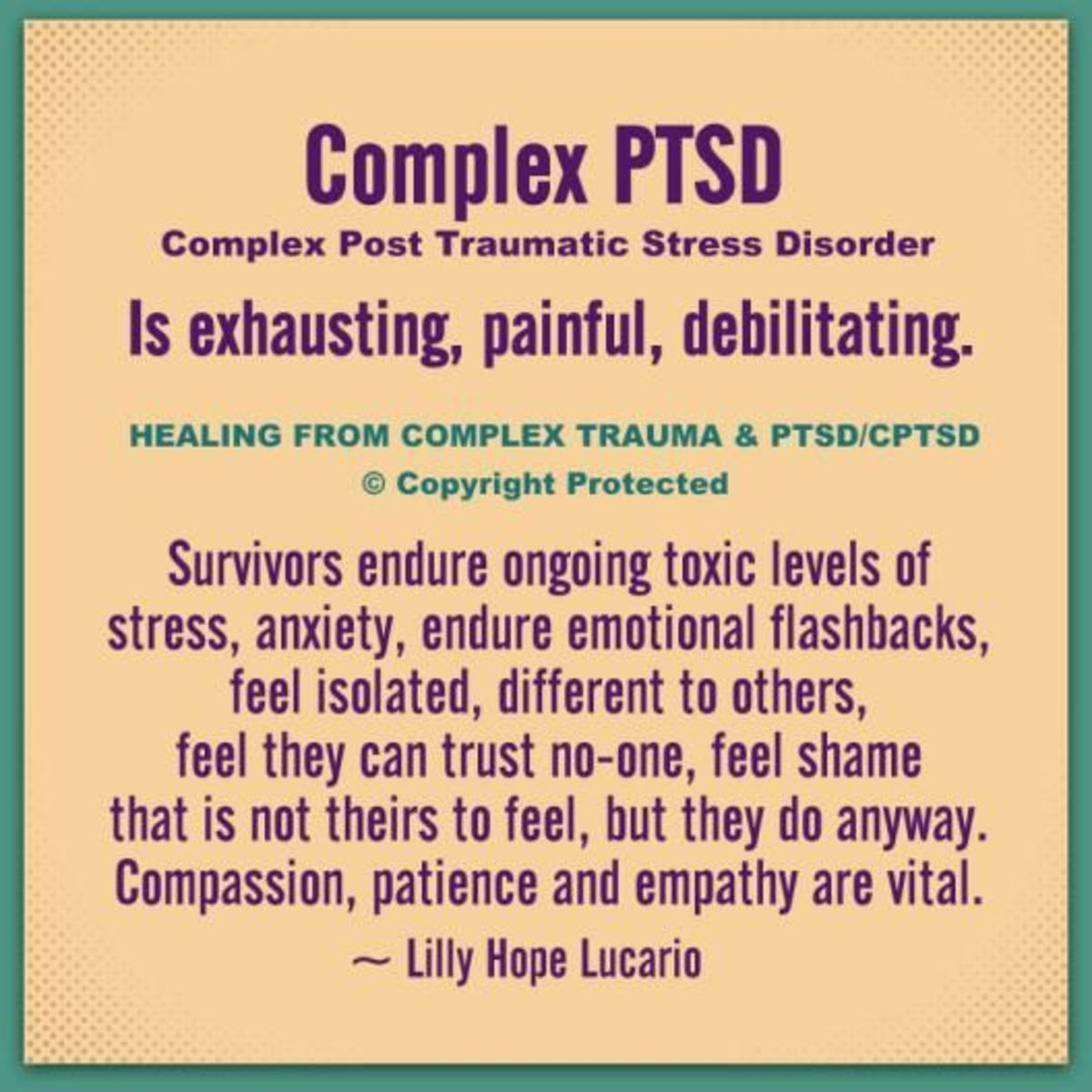- HubPages»
- Health»
- Mental Health»
- Anxiety Disorders
Generalized Anxiety Disorder: Can it change to PTSD?
Introduction
After I got married, I told my husband that I had Generalized Anxiety Disorder, which is connected to my seizure disorder. He laughed at me and said, "what do you have to be stressed about?" Now, that he is my EX husband, he NOW knows that I was not lying when I told him that I had Generalized Anxiety Disorder, because later, it got worse.
What is GAD?
GAD or Generalized Anxiety Disorder is when a person excessively worries about everyday life events. We cannot stop worrying about health, money, family, work, or school. (You would think my ex-husband would understand this, since he had extreme test anxiety while going to college himself.) Daily life becomes a constant state of worry, fear, and dread. Eventually, the anxiety and worry dominates the person's thinking, and can interfere with daily functions, including work, school, social activities, and relationships. It can be paralyzing.
Symptoms of GAD
GAD affects the way a person thinks, and can lead to physical symptoms, such as excessive, ongoing worry and tension, an unrealistic view of problems, restlessness, irritability, muscle tension, headaches, sweating, difficulty concentrating, nausea, the need to go to the bathroom frequently, tiredness, trouble falling or staying asleep, trembling, and being easily startled.
Individuals with GAD often have other anxiety disorders, such as panic disorder or phobias, obsessive-compulsive disorder, or clinical depression.
Causes of GAD
What causes GAD is not fully known, but a number of factors is genetics, brain chemistry, and environmental stresses, appear to contribute to its development.
Some research suggests that family history plays a part in increasing the likelihood of developing GAD, which means there is a tendency that GAD is passed on in families.
GAD has been associated with abnormal functioning of nerve cell pathways that connect particular brain regions involved in thinking and emotion. If the pathways that connect particular brain regions do not run efficiently, problems related to mood or anxiety may result. Some treatments may help to improve the signaling between circuits and help to improve symptoms related to anxiety or depression.
Trauma and stressful events, such as abuse, the death of a loved one, divorce, changing jobs or schools, may contribute to GAD. GAD also may become worse during periods of stress. The use of and withdrawal from addictive substances, including alcohol, caffeine, and nicotine, can also worsen anxiety. (Which is why I am only a social drinker, stay away from caffeine and have never smoked.)
How common is GAD?
Roughly 4 million adult Americans suffer from GAD during the course of a year. It most often begins in childhood or adolescence, but can begin in adulthood. It is more common in women than in men. (Even when I was a child, I had problems sleeping and staying asleep. I remember one time, I was so exhausted from not being able to sleep that I fell asleep in my grandparents backyard in Canada. The breeze was so calming and it just lulled me to sleep.)
Outlook of GAD
Although many people with GAD cannot be cured and symptoms can return from time to time, most people gain substantial relief from their symptoms with proper treatment.
While GAD can not be prevented. There are some things that you can do to control or lessen symptoms, such as stop or reduce consuming products that contain caffeine, such as coffee, tea, cola and chocolate.
Ask your doctor or pharmacist before taking any over the counter drugs or herbal remedies, as many contain chemicals that can increase anxiety symptoms.
Exercise daily and eat a healthy, balanced diet.
Seek counseling and support after a traumatic or disturbing experience.
Practice stress management techniques like yoga or meditation.
GAD/PTSD
It has been said that Generalized Anxiety Disorder and Post Traumatic Stress Disorder can co-occur together, but PTSD would cause different symptoms from GAD.
However, in this article: http://www.divorcemed.com/Articles/ArticlesByDiane/The%20Psychological%20Stages%20of%20Divorce.htm
They no longer label mental illness to divorce, because it is a natural process you have to go through to get through the divorce. Some just go their own pace to see the light on the other side. This article was quite enlightening to read. Even the part about having adolescent children.
PTSD
PTSD symptoms tend to develop about three months after a traumatic event, but may not surface until months after the event. Symptoms such as: *Intrusive thoughts recalling the traumatic event, nightmares, flashbacks, *efforts to avoid feelings that may remind you of the event or that trigger the same feelings, *feeling detached or unable to connect with loved ones, depression and *hopelessness, *feelings of guilt (from the false belief that you are responsible for the traumatic event), *irritability or angry outbursts, being overly aware of possible danger, *hypersensitivity, *headache, *insomnia, and *rapid heart rate, *breathing and *increase in blood pressure. Diminished responsiveness to the external world, referred to as psychic numbing or emotional anesthesia, usually begins after the traumatic event. A person may complain of feeling detached or estranged from other people, that he or she has lost the ability to become interested in previously enjoyed significant activities, or that the ability to feel emotions of most types, especially those associated with intimacy, tenderness, and sexuality, is markedly decreased.
PTSD experts are not certain what causes PTSD. However, many think it happens when you are confronted with a traumatic event, and the mind is not able to process all the thoughts and feelings as it usually does. You are just on some kind of pressure overload.
Myths
It is a myth that everyone who experiences a life-threatening event will develop PTSD. Most people who are exposed to traumatic events will not get PTSD at all, and many see a decrease in symptoms over the months following an incident. However, thirty seven percent of people exposed to intentional trauma tend to develop PTSD, such as losing reasonable health insurance, and you have to have a biopsy for cervical cancer, and being unemployed.
It is a myth that only people who are weak get PTSD.
Women are twice as likely to be diagnosed with PTSD than men are, however, women are more likely to be diagnosed with many mental disorders because they are more likely to seek help. People who are exposed to interpersonal trauma are more likely to have PTSD symptoms than survivors of accidents or natural disasters. Social support is also important to trauma resilience. None of these factors have anything to do with inner strength. In fact, it's possible that an especially strong defense symptom is the culprit.
People that are at risk for PTSD are those with a history of sexual or physical abuse, working in a high risk occupation, a history of depression or psychological disorder, abusing drugs or alcohol, not having adequate social support, veterans of war, survivors of unexpected events, and survivors of natural disasters.
There is a physical component to the trauma which may involve direct damage to the central nervous system, such as malnutrition, and head trauma. *This disorder is apparently more severe and longer lasting when the stressor is of human design. Symptoms are often intensified when activities resemble the actual trauma.
People with PTSD often have problems functioning. In general, people with PTSD have more unemployment, divorce or separation, spouse abuse and chance of being fired than people without PTSD. Vietnam veterans with PTSD were found to have many problems with family and other interpersonal relationships, problems with employment, and increased incidents of violence.
Associated features: symptoms of depression and anxiety, and in some instances may be so severe as to be diagnosed as an anxiety or depressive disorder. Increased irritability, unexpected explosions of aggressive behavior. Impulsive behavior also can create problems such as unexplained trips, unexplained changes in life styles. Symptoms may begin immediately or soon after the trauma. It is not unusual, however, for the symptoms to surface months or years later following the trauma. Impairment may be mild or affect every aspect of life. One may start avoiding situations or activities that resemble the trauma. Psychic numbing often interferes with interpersonal relationships, such as family life. It often leads to self defeating behavior, including suicide, substance abuse.
Celebrities with PTSD
Actress Whoopi Goldberg, Singer Barbra Streisand, Singer Mick Jagger, Saturday Night Live comedian and impressionist Darrell Hammond, The First lady to President John F. Kennedy - Jacqueline Kennedy Onassis, Singer and song writer Alanis Morissette, Singer Shania Twain, Actress Charlize Theron, Actress Demi Moore, Actor Keanu Reeves, Actor Tobey McGuire, Actor Johnny Depp, talk show host and business woman - Oprah Winfrey. Singer Sinead O'Connor, and Actress Sally Field has an anxiety issue as well.
In conclusion
PTSD is NOT just for military combat personnel. PTSD can be quite a few traumatic events, such as divorce, unemployment, abandonment, bankruptcy, abuse, homelessness, death of a loved one and health issues. In which I have been through them all that are listed here, one after the other, after the other, after the other....and I am sure there are many more traumas that can be added to this list. This is also probably why I take to canines so well. Just like autistic children, canines bring out the best in them. Bringing them out of their shell. Therapy dogs are being used by those with PTSD.
In my years with Generalized Anxiety Disorder, I did not know that GAD and PTSD can co-occur together. PTSD is not simply a normal response to an abnormal event; it is an anxiety disorder that involves specific kinds of physical and mental changes. It is hypothesized that only after successful reprocessing of the traumatic event(s) do PTSD symptoms decrease.
However, the only medical issues that my now ex-husband retained about me was my seizure disorder. He didn't believe me when I told him that I had GAD, and he told a nurse false medical information when I was in labor with child #3. Many issues prove that he has ADHD, just as many issues had proved that I have Epilepsy, GAD and PTSD. (I have been seizure free for 3 years in November 2018.)
It has become the norm to have these issues. No one is perfect. You just have to find what is and works perfectly for you. Some people may be still searching, and my heart goes out to you.
Medically, at my last neurologist appointment, my doctor changed my anxiety medication. I had a few more headaches than I normally do, but it wasn't too bad. However, my doctor informed me that the new anxiety medication did not give me the migraines. The weaning from the other anxiety medication gave me the migraines, which appear to be gone now.
Therefore, it has been proven that disorders CAN and DO stem into or from something else. Yet another disorder. ADHD into Bipolar. Seizures into GAD into PTSD. ADHD into test anxiety. ADHD into dyslexia. Autism into Bipolar. Or vice versa. I have lived it, personally, and I now see it, professionally. Because I have lived it, personally, is why I am able to connect to my clients at this level. Many social workers become social workers because they have been there to. Most substance abuse counselors are counselors because they themselves got addicted. Most employment establishments will only hire a substance abuse counselor IF they themselves had been clean for so many years. It's true. Because when we had our first meeting after our company merger, and we went to a meet and greet with the other half, that offer other services, going around the room, these professionals also stated how long they have been clean and working with their clients. Proof that making a difference in a job is part of well-being. Especially a job when you know that you are making a difference in others lives. I have seen some clients just automatically click into their employment positions. I have seen some clients that do not, and someone else will just have to keep trying to find the right position for them. If that is still an option for them. For some, it is trial and error. However, when a client clicks with that employment position. They soar. It is rewarding to see them start to carve out a place for themselves in the community.
On a personal note, I don't believe my ex-husband knew me at all, which is disappointing, but I'm not going back to tell him who I am. At this point, it doesn't matter. What matters is that I know me, and I always have. I knew I had a seizure disorder. I knew I had GAD. I didn't know that it can stem into PTSD. However, I know that now. It isn't my fault that my ex-husband couldn't accept the GAD, and his being a medical professional. That's his fault.
Now, I am to a place where I like my life. My father hasn't always been the father that I have needed throughout my early life. However, he has been amazingly supportive now, to where if I am working late, and can't take my trash out, he does the chore for me so he can put the trash on the side of the road for pick up. One day, just to be funny, I asked him, "Can you be my wife today and go and get me a package of spring water?" I didn't remind him, and he did it. He said, "That will be $2.75." I gave him $3.00. He said, "I'll keep the quarter as my tip." LOL I didn't care. Despite our previous issues, I look at what he has accomplished with his life, and I am not ashamed. I am proud. I will always be proud of where my family originated. That includes not caring how people feel about Justin Bieber.
So, just remember, even though we are all a part of the human race, we are all wired differently. What is apparent and common sense to one person will not be apparent and common sense to another person. Remembering this could really take frustration out of so many lives, and believe me, I know about frustration.








